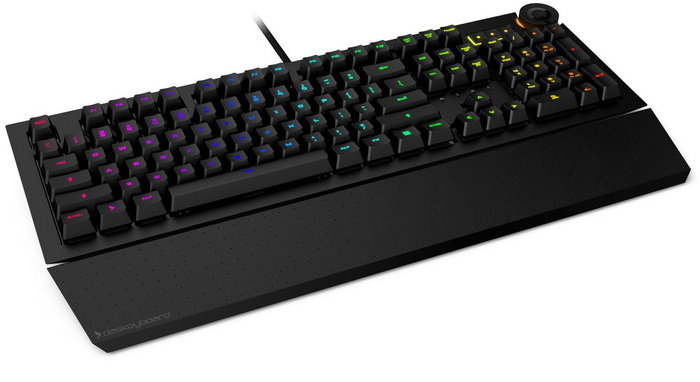INTRODUCTION

Once upon a time the one thing you had to decide when heading out to get a brand-new keyboard was your available budget since the sole difference between models was build quality (sometimes not even that, just brand name). Today however as all of you know things are vastly different and so leaving out your available budget (perhaps still the most important factor) you also need to know what type (membrane or mechanical) and model of switches (Cherry alone has 12 different models currently), illumination color (single and/or RGB), length/factor (full size or tenkeyless) and extra features (like dedicated media controls, macro keys and USB port/s) you'd like your keyboard to have. Das Keyboard recently took things one step further with their brand-new smart cloud connected keyboards and after reviewing the rather impressive X50Q model a while back today and after almost 2 months of testing our review of the 5Q is finally ready.
Das Keyboard, a brand of Metadot, makes high-quality mechanical keyboards. The company is headquartered in Austin, Texas and is dedicated to delivering innovative technology products to increase productivity. Created in 2005, Das Keyboard has been praised by major media outlets, techie magazines, geeks and regular people who use and rely on keyboards to be productive throughout the workday. For more information, please visit www.daskeyboard.com.
Das Keyboard announced the availability of both the X50Q and the 5Q back in August of this year for a reason, they are very much alike. Both keyboards feature the Gamma Zulu mechanical switches manufactured by the Japanese OMRON (up to 100 million actuations/enhanced brightness mode via USB 3.0/45 grams actuation force), RGB per-key backlight with 6 effects and 10 brightness levels, full N-KEY rollover (NKRO) with 100% anti-ghosting, dedicated media controls, aluminum top panels, 2 meter long braided cables and detachable palm rests. Both keyboards also feature the Q smart alert system which can send notifications of new emails, system resource allocation, weather forecasting, stock trends and more onto the keyboard itself (also supports alerts from IFTTT and Zapier compatible WiFi enabled devices). Aside some aesthetic touches (most noticeably the size of the Q buttons/volume knobs, texture of the keycaps and the palm-rests - clip design plastic for the X50Q and magnetic silicone for the 5Q) key response time is the most important difference between these two keyboards so although the X50Q has 20ms thanks to its analog key detection (RTO) the 5Q has just 1ms ("fastest" electronics in the industry according to Das Keyboard). This may not be a game-breaking difference but for some people the extra reduction in lag could be an interesting feature.

 O-Sense
O-Sense







.png)

